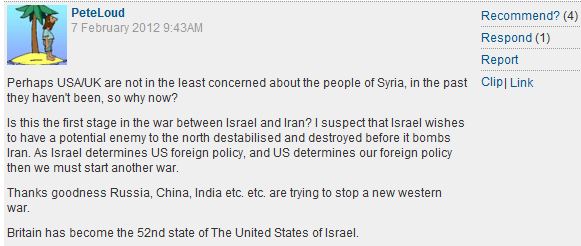A Guest Post by Richard Millett
The BBC has had many notorious anti-Israel episodes over the years – too many to mention them all – but here are a few to jog the memory.
BBC journalist Barbara Plett said she “started to cry” as Yasser Arafat left the West Bank in 2004 to go to France for treatment not long before he died. BBC governors ruled her comments “breached the requirements of due impartiality”.
In 2006 Orla Guerin reported, while standing in front of damaged buildings in Bint Jbeil, Lebanon, that the town had been “wiped out” by the Israeli air force. Meanwhile, Alex Thompson, of Channel 4 News, correctly reported “the suburbs pretty much untouched by the Israeli attack and invasion”.
More recently the Itamar massacre was hardly mentioned on the BBC despite its many TV and radio news programmes. The BBC eventually apologised and blamed its oversight on a “very busy news period”. Five Israelis being stabbed to death in their family home by two Palestinian terrorists, including a baby girl in her bed, was not deemed newsworthy enough by the BBC.
Another even more recent example was Will Gompertz’s review of Habima’s ‘The Merchant of Venice’ at The Globe in May which appeared in the Entertainment & Arts section of the BBC website. In the review, which was headlined “The Merchant of Venice: A protest within a play”, Gompertz proceeded to review the disruptions by anti-Israel activists instead of the actual play itself.
Gompertz even described one of the anti-Israel activists as “a handsome grey-haired woman” and, instead of condemning the disruptions out of hand, he merely mused “about the rights or wrongs of staging a protest in a theatre where the majority of the people have paid to see a show”.
Such partiality continues to this day in the guise of Jeremy Bowen, the BBC’s Middle East Editor. On October 5th 2012 Bowen retweeted to his 21,333 Twitter followers, which he has courtesy of his position at the BBC, a tweet by Joseph Dana who was “curious that Israeli forces can fire tear gas and use stun grenades next to the Al Aqsa mosque and the story doesn’t make international waves”.
Had Bowen bothered to have a brief browse he would have found articles giving him the all-important context.
Ynet reported that several hundred Arab worshippers stoned the Israeli police before the police “used crowd-control measures to disperse the crowd.” Israel Hayom reported how “police came under a barrage of rocks”. The Times of Israel reported how “hundreds of Arabs threw stones at security guards”.
In addition to the stone-throwing, The Jerusalem Post reported that “an Arab man tried to stab a police officer” and that “rioters on the Mount threw rocks in the direction of the Western Wall Plaza, but police officers were able to stop them before any rocks reached Jewish worshippers below”.
Joseph Dana, who lives in Ramallah and is a prolific anti-Israel activist, is hardly an objective and reliable source for reporting on Israeli matters. Appearing in November 2011 at the School of Oriental and African Studies in London to give a talk, Dana answered – when asked by an audience member whether Zionism was “the work of the devil” – that he, Dana, had managed to free himself from a “Zionist indoctrination programme”. It really is ludicrous for Bowen to quote Dana as a serious source on Israel.
The recent Leveson Enquiry on media ethics addressed the media’s reporting of individuals but, sadly, did not get round to addressing how the media reports on countries.





